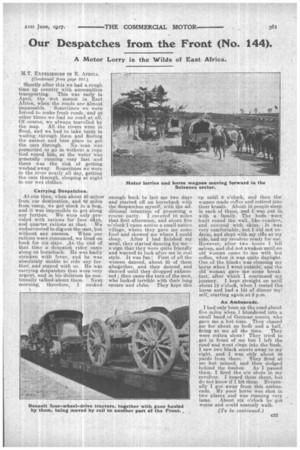Our Despatches from the Front (No. 144).
Page 19

If you've noticed an error in this article please click here to report it so we can fix it.
A Motor Lorry in the Wilds of East Africa.
M.T. EXPERIENCES IN E. AFRICA. (Continued from page 341.) Shortly after this we had a rough time up country with ammunition
transporting. This was early in April, the wet season in East Africa, when the roads are. almost impassable. Sometimes we were forced to make fresh roads, and at other times we had no road at all. Of course, we always travelled by the map. All the rivers were in flood, and we had to take turns in wading through them and finding the easiest and best place to get the cars through. No man was permitted to go in without a rope tied round him, as the water was generally running very fast and there was the risk of getting washed away. Sometimes we were in the river nearly all day, getting the cars thgough, sleeping at night in our wet clothes.
Carrying Despatches.
At one time, when about 40 miles,' from 'our destination, and 80 miles from camp, we got stuck in a bog, and it was impossible to get along any further. We were only provided with rations for four drays, and quarter rations at that. We endeavoured to dig out the ears, but without any success. When our rations were consumed, we lived on buck for six days. ,At. the end of that time a despatch rider came along on horseback. He was badly stricken with fever, and he was absolutely linable to ride any further, and stayed with us. Hewas carrying despatches that were very urgent, and in his delirium he continually talked' about them. ' Next morning; therefore, I cooked enough buck to last me two days and started off on horseback witji the despatches myself; with the ad ditional intention of procuring a rescue party. I covered 10 miles that first afternoon, and about five ,o'clocki came acrciss a small native village, where they gave me some food and showed me where I could
sleep. After I had finished my meal, they started dancing for me— a sign that they were quite friendly and wanted to look after mein real style. It was fun First of all the women danced, about 20 of them altogether, and they danced, and danced until they dropped exhausted; then carne the turn of the men, who looked terrible with their long spears and elubs. They kept this
up until 8 o'clock, and then the. wemen made coffee and retired into their kraals. About 16 people sleep in each of these, and I was put in with a family. The 'beds, -were, built round the wall, like -couches, and covered with skins. It was very comfortable, but I did not undress, and slept with my rifle at my side, and my revolver ready for use. However, after two hours I fell asleep, and did not awaken until an old woman came to me with hot coffee, when it was quite daylight, One .of the blacks was cleaning my horse when I went outside-, and the old woman gave me some breakfast, after which I continued my. journey. I kept straight on until about 12 o'clock, when I rested the,. horse and had a bit of dinner my-: self, starting again at 2 p.m.
An Ambuscade.
I had only been on the road about five miles when I blundered into a small band of German scouts, who gave rne a hot time. They chased me for about an hoffi and a half, firing at me all the time. They were rotten shots ! They tried to get in front of me but I left the road and went clean into the bush. I saw two black scouts away to my right, and I was only about :10 yards from them. They fired at me but missed, and then dodged behind the bushes. As I passed them, I fired the six shots in my revolver. I heard them shout, but do not know if I hit them. Eventually I got away from this ambuscade. My poor horse was shot in two places and was running very lame. About six o'clock he got worse and could scarcely walk.






















